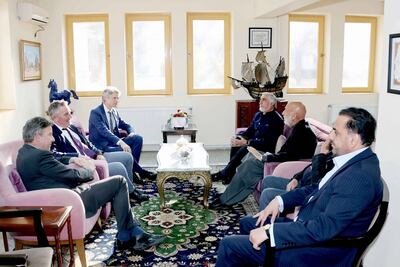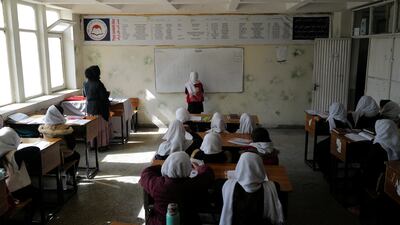Talks between German and Dutch officials and the Taliban in Kabul have emphasised the need to improve the “dire humanitarian situation” in Afghanistan.
The meeting will be welcomed by NGOs in the country, which on Friday called for greater dialogue with the Taliban and further aid assistance for the Afghan people following the withdrawal of US and Nato troops earlier this year.
Following the talks, the German Foreign Office released a hopeful statement which said the Taliban recognised the need for collaboration to prevent the crisis from worsening, especially in the health and education sectors.
Of even greater significance, it said the de facto Afghan government “expressed their understanding that equal access to education for both girls and boys is a matter of national security".
Afghan authorities acknowledged the right of girls to attend primary and secondary education up to grade twelve and the need for female teachers to continue in their posts.
“Curricula for these schools will remain unchanged,” the statement said.
In an attempt to resolve the salary shortage for all teachers and health workers in Afghanistan, Germany and the Netherlands proposed using international organisations to disburse funds into their accounts.
Details of which organisations may be used as funnels were not forthcoming but a range of other agreements were.
They mainly centred round the continuation of a general amnesty and the commitment to free passage for those wishing to leave Afghanistan.
The Taliban also said it would “never allow again [Afghanistan] to be abused as a base or a source for international terrorist threats,” according to the German Foreign Office.
Even if the commitment is sincerely held, seeing it through may prove beyond the Taliban's control.
The UN on Wednesday said ISIS has been “increasingly active” in Afghanistan since the Taliban takeover, with a sharp rise in the number of attacks and an expanding national footprint.

UN envoy Deborah Lyons said the country's collapsing economy was pushing Afghans into informal sectors and making them more vulnerable to exploitation and radicalisation.
The German Foreign Office statement did not acknowledge these difficulties and said future “engagement would be based on the implementation of the agreed measures".
Germany's Special Envoy for Afghanistan and Pakistan Jasper Wieck, Dutch Special Envoy for Afghanistan Emiel de Bont and Germany's designated ambassador to Afghanistan Markus Potzel were the officials in the German-Dutch delegation for the talks.
Present in the Taliban delegation were de facto deputy prime ministers Abdul Ghani Baradar and Abdul Salam Hanafi, de facto foreign minister Amir Khan Motaqi and de facto director of intelligence Abdul Haq Wasiq.

